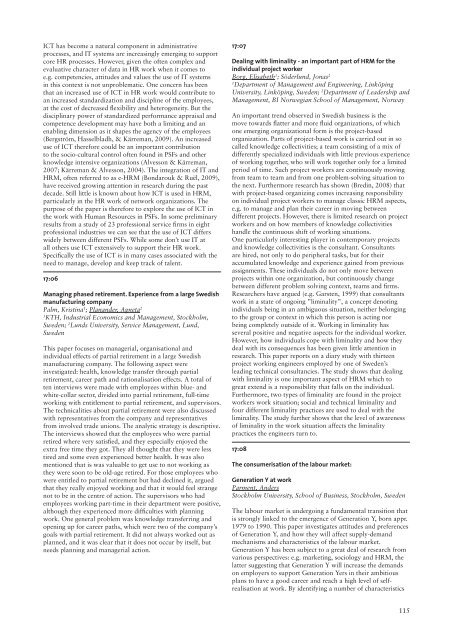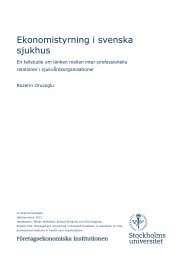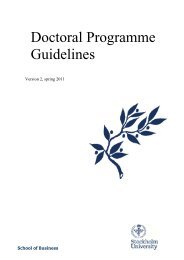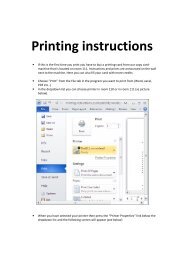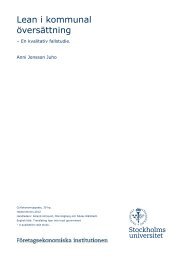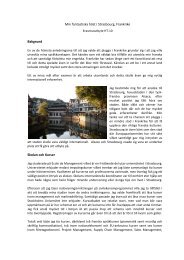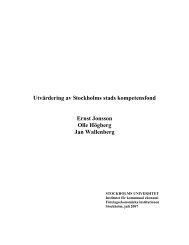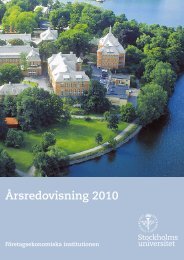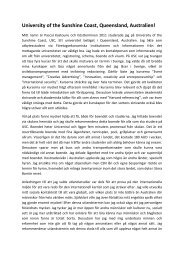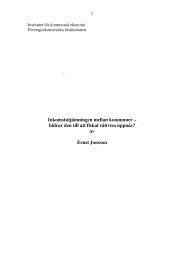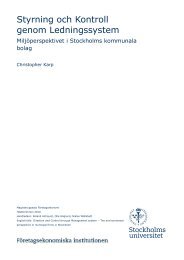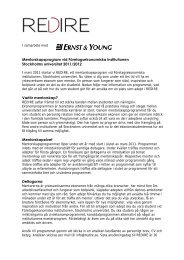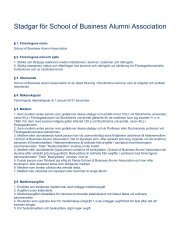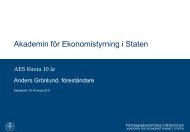Download full programme and abstract book pdf 1.6
Download full programme and abstract book pdf 1.6
Download full programme and abstract book pdf 1.6
You also want an ePaper? Increase the reach of your titles
YUMPU automatically turns print PDFs into web optimized ePapers that Google loves.
ICT has become a natural component in administrative<br />
processes, <strong>and</strong> IT systems are increasingly emerging to support<br />
core HR processes. However, given the often complex <strong>and</strong><br />
evaluative character of data in HR work when it comes to<br />
e.g. competencies, attitudes <strong>and</strong> values the use of IT systems<br />
in this context is not unproblematic. One concern has been<br />
that an increased use of ICT in HR work would contribute to<br />
an increased st<strong>and</strong>ardization <strong>and</strong> discipline of the employees,<br />
at the cost of decreased flexibility <strong>and</strong> heterogeneity. But the<br />
disciplinary power of st<strong>and</strong>ardized performance appraisal <strong>and</strong><br />
competence development may have both a limiting <strong>and</strong> an<br />
enabling dimension as it shapes the agency of the employees<br />
(Bergström, Hasselbladh, & Kärreman, 2009). An increased<br />
use of ICT therefore could be an important contribution<br />
to the socio-cultural control often found in PSFs <strong>and</strong> other<br />
knowledge intensive organizations (Alvesson & Kärreman,<br />
2007; Kärreman & Alvesson, 2004). The integration of IT <strong>and</strong><br />
HRM, often referred to as e-HRM (Bondarouk & Ruël, 2009),<br />
have received growing attention in research during the past<br />
decade. Still little is known about how ICT is used in HRM,<br />
particularly in the HR work of network organizations. The<br />
purpose of the paper is therefore to explore the use of ICT in<br />
the work with Human Resources in PSFs. In some preliminary<br />
results from a study of 23 professional service firms in eight<br />
professional industries we can see that the use of ICT differs<br />
widely between different PSFs. While some don’t use IT at<br />
all others use ICT extensively to support their HR work.<br />
Specifically the use of ICT is in many cases associated with the<br />
need to manage, develop <strong>and</strong> keep track of talent.<br />
17:06<br />
Managing phased retirement. Experience from a large Swedish<br />
manufacturing company<br />
Palm, Kristina 1 ; Plan<strong>and</strong>er, Agneta 2<br />
1 KTH, Industrial Economics <strong>and</strong> Management, Stockholm,<br />
Sweden; 2 Lunds University, Service Management, Lund,<br />
Sweden<br />
This paper focuses on managerial, organisational <strong>and</strong><br />
individual effects of partial retirement in a large Swedish<br />
manufacturing company. The following aspect were<br />
investigated: health, knowledge transfer through partial<br />
retirement, career path <strong>and</strong> rationalisation effects. A total of<br />
ten interviews were made with employees within blue- <strong>and</strong><br />
white-collar sector, divided into partial retirement, <strong>full</strong>-time<br />
working with entitlement to partial retirement, <strong>and</strong> supervisors.<br />
The technicalities about partial retirement were also discussed<br />
with representatives from the company <strong>and</strong> representatives<br />
from involved trade unions. The analytic strategy is descriptive.<br />
The interviews showed that the employees who were partial<br />
retired where very satisfied, <strong>and</strong> they especially enjoyed the<br />
extra free time they got. They all thought that they were less<br />
tired <strong>and</strong> some even experienced better health. It was also<br />
mentioned that is was valuable to get use to not working as<br />
they were soon to be old-age retired. For those employees who<br />
were entitled to partial retirement but had declined it, argued<br />
that they really enjoyed working <strong>and</strong> that it would feel strange<br />
not to be in the centre of action. The supervisors who had<br />
employees working part-time in their department were positive,<br />
although they experienced more difficulties with planning<br />
work. One general problem was knowledge transferring <strong>and</strong><br />
opening up for career paths, which were two of the company’s<br />
goals with partial retirement. It did not always worked out as<br />
planned, <strong>and</strong> it was clear that it does not occur by itself, but<br />
needs planning <strong>and</strong> managerial action.<br />
17:07<br />
Dealing with liminality - an important part of HRM for the<br />
individual project worker<br />
Borg, Elisabeth 1 ; Söderlund, Jonas 2<br />
1 Department of Management <strong>and</strong> Engineering, Linköping<br />
University, Linköping, Sweden; 2 Department of Leadership <strong>and</strong><br />
Management, BI Norwegian School of Management, Norway<br />
An important trend observed in Swedish business is the<br />
move towards flatter <strong>and</strong> more fluid organizations, of which<br />
one emerging organizational form is the project-based<br />
organization. Parts of project-based work is carried out in so<br />
called knowledge collectivities; a team consisting of a mix of<br />
differently specialized individuals with little previous experience<br />
of working together, who will work together only for a limited<br />
period of time. Such project workers are continuously moving<br />
from team to team <strong>and</strong> from one problem-solving situation to<br />
the next. Furthermore research has shown (Bredin, 2008) that<br />
with project-based organizing comes increasing responsibility<br />
on individual project workers to manage classic HRM aspects,<br />
e.g. to manage <strong>and</strong> plan their career in moving between<br />
different projects. However, there is limited research on project<br />
workers <strong>and</strong> on how members of knowledge collectivities<br />
h<strong>and</strong>le the continuous shift of working situations.<br />
One particularly interesting player in contemporary projects<br />
<strong>and</strong> knowledge collectivities is the consultant. Consultants<br />
are hired, not only to do peripheral tasks, but for their<br />
accumulated knowledge <strong>and</strong> experience gained from previous<br />
assignments. These individuals do not only move between<br />
projects within one organization, but continuously change<br />
between different problem solving context, teams <strong>and</strong> firms.<br />
Researchers have argued (e.g. Garsten, 1999) that consultants<br />
work in a state of ongoing ”liminality”, a concept denoting<br />
individuals being in an ambiguous situation, neither belonging<br />
to the group or context in which this person is acting nor<br />
being completely outside of it. Working in liminality has<br />
several positive <strong>and</strong> negative aspects for the individual worker.<br />
However, how individuals cope with liminality <strong>and</strong> how they<br />
deal with its consequences has been given little attention in<br />
research. This paper reports on a diary study with thirteen<br />
project working engineers employed by one of Sweden’s<br />
leading technical consultancies. The study shows that dealing<br />
with liminality is one important aspect of HRM which to<br />
great extend is a responsibility that falls on the individual.<br />
Furthermore, two types of liminality are found in the project<br />
workers work situation; social <strong>and</strong> technical liminality <strong>and</strong><br />
four different liminality practices are used to deal with the<br />
liminality. The study further shows that the level of awareness<br />
of liminality in the work situation affects the liminality<br />
practices the engineers turn to.<br />
17:08<br />
The consumerisation of the labour market:<br />
Generation Y at work<br />
Parment, Anders<br />
Stockholm University, School of Business, Stockholm, Sweden<br />
The labour market is undergoing a fundamental transition that<br />
is strongly linked to the emergence of Generation Y, born appr.<br />
1979 to 1990. This paper investigates attitudes <strong>and</strong> preferences<br />
of Generation Y, <strong>and</strong> how they will affect supply-dem<strong>and</strong><br />
mechanisms <strong>and</strong> characteristics of the labour market.<br />
Generation Y has been subject to a great deal of research from<br />
various perspectives: e.g. marketing, sociology <strong>and</strong> HRM, the<br />
latter suggesting that Generation Y will increase the dem<strong>and</strong>s<br />
on employers to support Generation Yers in their ambitious<br />
plans to have a good career <strong>and</strong> reach a high level of selfrealisation<br />
at work. By identifying a number of characteristics<br />
115


